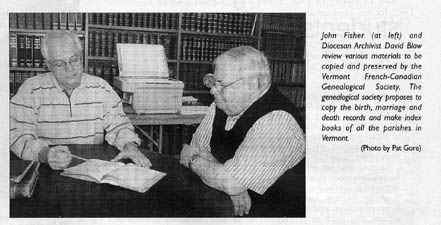Genealogical Society approved to preserve diocesan records
Vermont Catholic Tribune 27 February 2004
Cori Fugere Urban

Vermont French-Canadian Genealogical SocietyWorking To Preserve Parish Sacramental Records
BURLINGTON-The Diocese of Burlington is "at a high risk" of losing to deterioration aging sacramental records kept in books stored in parishes, but thanks to the Vermont French-Canadian Genealogical Society, information will be preserved as precious records will be copied and CD-ROMs made of the database for the individual parish and for the diocesan archives here. "This service would provide duplication and preservation of our records," said John Fisher, president of the genealogical society. "The Vermont Catholic diocese is at a high risk of losing its valuable birth, marriage and death records at the parish level. There are currently no duplicate copies at the (Bishop) Brady Center archives, except for the few books compiled by various genealogy societies."
In addition, much of the information recorded before 1857 is the only information available because there was no state law for record keeping until that year.
In December a subcommittee of the diocesan Presbyteral Council met with members of the Vermont French-Canadian Genealogical Society at its library in the Fort Ethan Allen Complex in Colchester to discuss the aging and deteriorating condition of the diocese's old sacramental records and the need for their preservation and to discuss the accessibility of those records for historical research by the public, especially because of the lack of public documentation before 1857.
The deterioration of these records is of concern because the old paper tears and becomes brittle over time, the ink smudges with too much handling, and the bindings break. These are also primary source documents; if they are destroyed, the information is lost forever.
Father Lance W. Harlow, pastor of St. Anthony Church in Bethel and a member of the subcommittee, said, "Access to church history is important and we would not want that history to be lost. Computers and CDs will be around for generations and are much better way of keeping files." He noted that the other important service that the genealogical society will provide is the accurate translation of Latin and French entries into English. "They are doing more than just copying old books; they are helping future generations understand the past and reminding us all of the role the Catholic Church has played in human history." After discussing ways to preserve the records and make them available, the genealogical society proposed that it undertake a 10-year project of copying the birth, marriage and death records and make index books of all the parishes in Vermont. Priority would be given to the oldest parishes and would tentatively include information from the mid-19th century to 1930. Sacramental records would be copied by genealogical society personnel at the parishes so the record books would not be removed from the parish. In January, Burlington Bishop Kenneth A. Angell accepted the recommendation of the subcommittee.
The genealogical society has begun copying the oldest and most fragile records at the diocesan archives and has already preserved about 1,000 pages of records.
Fisher pointed out that there will be numerous benefits to preserving the sacramental records in the way the subcommittee recommended. "It reduces and/or eliminates wear and tear on fragile books," he noted, and diminishes parish re-binding costs to maintain the books. The non-profit society will also fully index records for better reference, and the books will be copyrighted to prevent information from being copied. The genealogical society will own the copyrights and will sell 25-30 copies to libraries and genealogical societies to cover its costs. These copies will exclude "pastoral remarks" that might contain confidential information. Only the parish will have a copy with the restricted information, and it will not be accessible to the general public.
"The diocesan pastoral planning initiative, which has been under discussion for some time, should be broad enough to encompass the preservation of our vital records to which future generations will need access," Father Harlow noted. "This is at least a 10-year project, which means that a large percentage of the (current) active clergy will be inactive by its completion; hence, all the more reason to begin its implementation now." Monsignor John R. McSweeney, a senior priest of the Diocese of Burlington and a member of the committee that studied the copying of sacramental records, said it is important to preserve the information contained in the records because "it's the heritage of our people, the sacramental history of the people of God of the Diocese of Burlington." The Vermont French-Canadian Genealogical Society is providing this service free of charge.
"This is a great work that they are doing," commented Father Walter D. Miller, chancellor of the Diocese of Burlington and custodian of the records.